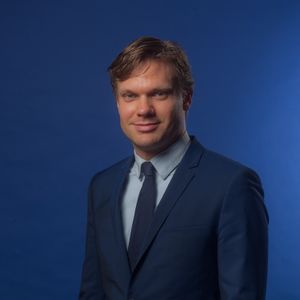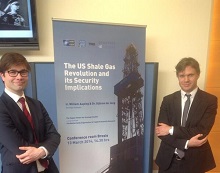Sijbren de Jong
(Social scientist, consultant, deep state operative(?)) | ||||||||||||||||||||||||||||||||||
|---|---|---|---|---|---|---|---|---|---|---|---|---|---|---|---|---|---|---|---|---|---|---|---|---|---|---|---|---|---|---|---|---|---|---|
 | ||||||||||||||||||||||||||||||||||
| Born | Nieuwegein(?), Netherlands | |||||||||||||||||||||||||||||||||
| Residence | Brussels, Belgium | |||||||||||||||||||||||||||||||||
| Nationality | Dutch | |||||||||||||||||||||||||||||||||
| Alma mater | University of Groningen | |||||||||||||||||||||||||||||||||
| Religion | Roman Catholic | |||||||||||||||||||||||||||||||||
| Member of | Integrity Initiative/Cluster/Netherlands, Netherlands/Deep state, The Hague Centre for Strategic Studies | |||||||||||||||||||||||||||||||||
| ||||||||||||||||||||||||||||||||||
Sijbren de Jong is a Dutch social scientist located in Brussels. Maria de Goeij set-up the Dutch cluster of the IfS in The Hague with the help of de Jong and his former employee, The Hague Centre for Security Studies, according to the the IfS leaks, with additional help from the Dutch Department of Defence.[1] He is also an experienced, known Dutch media figure, with numerous Dutch publications and TV appearances on policy-making regarding Russia and recently, China.[2] He currently works for the NATO HQ in Brussels.
Contents
Background
Sijbren de Jong is a Dutch geographer graduated from the University of Groningen. He also has a PhD in European-Russian ecological relations since 2013 from the Catholic University Leuven. After graduating, he started writing for several media outlets including the EUObserver, a popular online-only political newspaper, helping to placing it only behind The Financial times in terms of cited publications in the EU diplomatic community.[3] De Jong has a specific focus on Russia and former Soviet-states. He started working for the The Hague Centre for Security Studies in 2012. Apart from his native language he is also fluent in French, German and Russian next to English.
Career
Sijbren de Jong began his career as a recruiter for marketing purposes in 2007 at the Atlantic Community, the first online foreign policy think thank started by German-American NGOs and lead by experienced prominent figures such as Horst Köhler and Lord Wallace of Saltaire[4]. He was responsible for Russia, Central & Eastern Europe and the CIS. During his study in Belgium he was also conducting research on EU foreign and security policy, primarily on Russia, Ukraine and Central Asia. After moving to the The Hague to become lecturer in geo-economics he started appearing in several Dutch current affairs programs,[5] being a outspoken figure against Russian involvement in Ukraine.[6]
Connections
Starting around the time of his employment at the The Hague Centre for Security Studies, he became a notable speaker with continuous appearances in support of the Dutch government and their "official narrative", with over 70 publications in Dutch prominent media and several abroad including The Atlantic Council, New York Times, Wall Street Journal, Politico and The Economist. He advertises himself as being experienced in working with high-level policy-makers in military and non-military positions.

Publications and public apperances
Most of his publications seem to focus on Russia with some notable examples;
1. The prevention of the growth of Russian gas pipelines, in particular Nordstream. His work around 2015 was getting citated in an effort to use Nordstream as a pawn in the research for the MH17-culprits.[7][8]
2. The prevention of Russian and Chinese economical and logistical agreements with Middle-Eastern countries, in particular regarding Syria and the Persian Gulf.[9]
3. He was one of the leading pundits on Dutch Corporate media calling for the deployment of ground troops in Syria, particularly after a Russian announcement for main military withdrawal in April 2016, citing it a good time to take the oil of IS.[10]
Democracy
De Jong urged the Dutch government to "ignore" referendums in multiple editorials in Dutch newspapers as well as online, after a sudden surge in support against the 2016 Ukraine–European Union Association treaty among several Dutch public broadcasters including the one that helped initiating the referendum - a legally consultative referendum - leading up to the polls. Directly addressing voters, he argued the broadcaster was "reasoning like the Kremlin" and people voting against further involvement of Ukraine with the EU would be "in favour of corruption" and are citing "propaganda of RT".[11] After the victory of the "NO"-camp, he argued the Dutch people "do not care" about the treaty because "only 4 million or 32% came to vote", calling the result an embarrassment, and repeating the request to ignore voters, citing the "imprisonment of the public figures that would've initiated this referendum if being suggested in Belarus or Azerbaijan" as his conclusive reasoning.[12]
IfS
According to Maria de Goeijj, a Dutch cluster of the II was set-up in 2017. She recalled that due to "internal politics within the think tank" the expert in this cluster found alternative employment in SHAPE, NATO HQ in Brussels, the current employer of de Jong.[13] It is not known what caused the split and if de Jong returned to the cluster.
References
- ↑ https://wikispooks.com/wiki/Document:Progress_report_on_establishing_national_clusters#Integrity_Netherlands
- ↑ https://www.linkedin.com/in/sijbrendejong/
- ↑ https://www.worldcat.org/title/mapping-foreign-correspondence-in-europe/oclc/955586223
- ↑ https://atlantic-community.org/about/
- ↑ https://www.youtube.com/watch?v=copW4Qzqq_4
- ↑ http://www.sieps.se/en/publications/2016/the-eurasian-economic-union-and-the-european-union-geopolitics-geo-economics-and-opportunities-for-europe-201611epa
- ↑ https://www.volkskrant.nl/nieuws-achtergrond/poetin-is-onze-beste-vriend~be4898b2/
- ↑ https://www.atlanticcouncil.org/blogs/new-atlanticist/why-nord-stream-ii-is-not-only-eastern-europe-s-problem/
- ↑ https://www.youtube.com/watch?v=-30zbEHFibY
- ↑ https://www.youtube.com/watch?v=8D5ljpAQgXE
- ↑ https://www.volkskrant.nl/columns-opinie/geenpeil-redeneert-als-kremlin~b8cca69b/
- ↑ https://neweasterneurope.eu/old_site/articles-and-commentary/1945-the-implications-of-the-dutch-no
- ↑ https://wikispooks.com/wiki/Document:Progress_report_on_establishing_national_clusters#Integrity_Netherlands